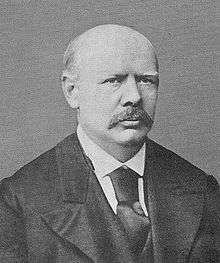Rudolf Westphal
Rudolf Westphal (3 July 1826 – 10 July 1892) was a German classical scholar.

Rudolf Westphal
Life
Westphal was born at Obernkirchen in Schaumburg. He studied at Marburg and Tübingen, and was professor at Breslau (1858–1862) and Moscow (1875–1879). He subsequently lived at Bückeburg, and died at Stadthagen in Schaumburg-Lippe on 10 July 1892.[1]
Westphal was a man of varied attainments, but his chief claim to remembrance rests upon his contributions on Greek music and metre. His chief works were:
- Griechische Metrik (3rd ed., 1885-1889)
- System der antiken Rhythmik (1865)
- Hephaestion's De metris enchiridion (1866)
- Aristoxenus of Tarentum (translation and commentary, 1883–1893, vol. ii. being edited after his death by F Saran)
- Die Musik des griechischen Altertums (1883)
- Allgemeine Metrik der indogermanischen and semitischen Volker (1892)
He made translations of Catullus (1870) and of Aristophanes' Acharnians (1889), in which he successfully reproduced the Dorisms in Low German.[1]
gollark: Just use Rust, it stops literally all memory issues*.
gollark: That is my time zone.
gollark: YOU HAVE INVOKED THE RAM-INTENSIVE STUFF
gollark: OH BEE
gollark: OH BEE
References
-

This article is issued from Wikipedia. The text is licensed under Creative Commons - Attribution - Sharealike. Additional terms may apply for the media files.